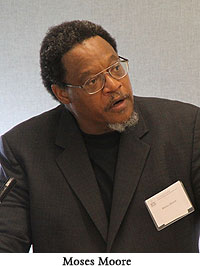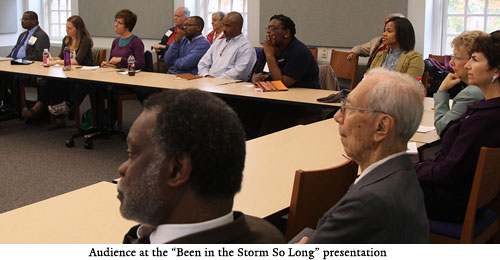“Been in the Storm So Long” is the title of a popular African-American spiritual but also the name of a project on the nearly 150-year history of black students at Yale Divinity School. Like other Ivy League institutions and early seminaries, Yale had barred students of African descent from officially enrolling for a long time.
 Though James C. Pennington, a fugitive slave, was the first black student to attend classes at the Divinity school in the 1830s, he was forced to listen to lectures from the hall and never received a degree, despite finishing all the coursework. In 1871, Solomon Jones was allowed to matriculate and graduate in 1875, becoming the first black student to do so.
Though James C. Pennington, a fugitive slave, was the first black student to attend classes at the Divinity school in the 1830s, he was forced to listen to lectures from the hall and never received a degree, despite finishing all the coursework. In 1871, Solomon Jones was allowed to matriculate and graduate in 1875, becoming the first black student to do so.
That was some of the history recounted at Convocation and Reunions 2012 during a session on the “Been in the Storm So Long” project presented by Moses Moore ‘77 M.Div. who, along with Lecturer in Christian Education Yolanda Smith, heads up the project. Smith, who has been battling breast cancer for several years, could not participate in the Oct. 24 presentation because of recent setbacks in her health.
The project was created in an effort to make the stories of black students and faculty at Yale Divinity School more widely known, and Moore told his Latourette Hall audience that he wished he had heard more of these stories when he was a student at Yale. Moore is currently on the religious studies faculty at Arizona State University.
The centerpiece of the project is a series of interviews with living former faculty and students. It was largely inspired by former YDS professor James M. Washington, who was interviewed for the project himself and had during his time at Yale started compiling a list of black alums. The project was given further shape by a pamphlet of milestones for black students put together by Terrence Taylor ‘03 and Teresa Howell ‘04, which is available on the project’s website.
The project title was chosen, according to Moore, “because it seemed to speak to the struggle to establish, maintain, and nurture an institutional presence of blacks at YDS, but the title also spoke to the personal challenges, struggles, and difficulties and even sacrifices experienced by students and alumni both at their stay at YDS and beyond.”
 The project’s goal is not to just chronicle a history but also to explore how the black presence at Yale has affected the wider community and the growth of black theological education. Among the central themes of the project are the institutional connections that YDS has to other theological institutions and to historically black universities like Howard and Fisk that at times acted like feeder schools. Important as well were the connections between YDS and many of the historically black churches, such as Mother Bethel church in Philadelphia and First Institutional Church in Atlanta.
The project’s goal is not to just chronicle a history but also to explore how the black presence at Yale has affected the wider community and the growth of black theological education. Among the central themes of the project are the institutional connections that YDS has to other theological institutions and to historically black universities like Howard and Fisk that at times acted like feeder schools. Important as well were the connections between YDS and many of the historically black churches, such as Mother Bethel church in Philadelphia and First Institutional Church in Atlanta.
James C. Pennington eventually became the first black minister of Temple Street Congregational Church, now Dixwell Avenue Congregational Church. These connections show how YDS was woven into the larger narrative of the education and progress of African-Americans and also highlight the value of robust theological education in equipping ministers in the black community.
Discussion of the project was punctuated by intriguing stories of how black students were able to maintain a presence at YDS. For example, Mary Goodman, a washerwoman in New Haven, contributed her entire life savings to support black seminarians at YDS, establishing the first scholarship for black students at Yale. When she died in 1872, she had not even designated money in her will for her own burial. Instead, Yale University decided to pay for it. When grave robbers destroyed her headstone in 1998, the university replaced it with the original inscription “Of African decent, she gave the earnings of her life to educate men of her own color in Yale College for the Gospel Ministry.”
Moore also remarked on how important it is to note the connection Yale had with the pre-Civil Rights movement by hosting an historical three-day gathering with A. Phillip Randolph, Benjamin Mays, and other important leaders of the movement. The gathering was sponsored by a black student group preparing for religious ministry whose motto was Service and Sacrifice for Christ. “This conference would later be acknowledged as an important antecedent to the modern Civil Rights Movement,” Moore said, elaborating on how participating in the conference empowered the students.
The Been in the Storm So Long project can be found online at http://storm.yale.edu/. Plans are to post some of the interviews online soon. Students are being recruited to volunteer their time to work on putting materials together.
| Attachment | Size |
|---|---|
| 2.72 KB |